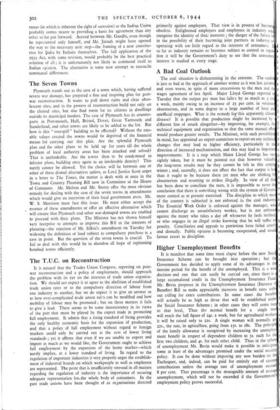The T.U.C. on Reconstruction
It is natural that the Trades Union Congress, reporting on post- war reconstruction and a policy of employment, should approach the problem with its eye on the interests of trade union organisa- tion. We should not expect it to agree to the abolition of established trade union rates or to the compulsory direction of labour from one industry to another, but we do expect it to give an answer as to how over-complicated trade union ruin can be modified and how mobility of labour may be promoted ; but on these matters it fails to give a lead. There seems to be some inconsistency in its views of the part that must be played by the export trade in promoting full employment. It admits that a rising standard of living provides the only healthy economic basis for the expansion of production, and that a policy of full employment without regard to foreign markets could only be carried out at the cost of lower living standards ; yet it affirms that even if we are unable to export and import as much as we would like, the Government ought to achieve full employment by the expansion of the home market—which surely implies, at a lower standard of living. In regard to the regulation of important industries it very properly urges the establish- ment of industrial boards on which workpeople as well as employers are represented. The point that is insufficiently stressed in all matters regarding the regulation of industry is the importance of securing adequate representation for. the whole body of consumers. In the past trade unions have been thought of as organisations directed
primarily against employers. That view is in process of becona obsolete. Enlightened employers and employees in industry t recognise the identity of theii interests ; the danger of the future Ii in the possibility of their becoming joint partners in industry c operating with too little regard .to the interests of consumers. so far as industry remains or becomes subject to control or sego tion it will be the Government's duty to see that the consume interest is studied at every stage.


























 Previous page
Previous page